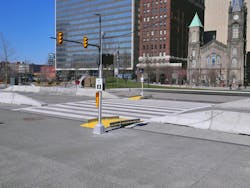ADA-compliant pedestrian ramp helps city open road on time
With a deadline approaching, one backed by a very large fine if it were missed, officials of the city of Cleveland, Ohio, recently reopened the part of Superior Avenue that runs through Public Square downtown.
The following timeline is an overview of the circumstances that led to the reopening of Superior Avenue, courtesy of local media reports:
June 30, 2016:
- The city of Cleveland completes a $50 million renovation of Public Square, reopens the square after 15 months of construction; and
- The city does not re-open to traffic the part of Superior Avenue that passes through the square.
Nov. 15, 2016:
- The city announces Superior Avenue through Public Square is closed permanently;
- Two reasons cited: maintain the square as one piece and reduce the risk of terror attacks;
- The city and the local public transit agency, Greater Cleveland Regional Transit Authority (RTA), to submit a plan to the Federal Transit Authority (FTA), which must approve the permanent closure; and
- RTA announces that the 900 buses that traveled daily on Superior Avenue across the square would instead continue to circle around Public Square.
Feb. 6, 2017:
- RTA releases traffic study: reopening the road to buses would reduce “operational risk to RTA operations, pedestrians, and motor vehicles around the perimeter roadway”;
- Per the study, the closure would cost RTA an additional $805,000 annually;
- RTA asks the city to reopen Superior Avenue by February 13;
- In August 2016, FTA had ruled that the city, by closing the street permanently, preventing buses from crossing, could be in violation of a 2004 agreement;
- FTA gave the city a February 21 deadline to reopen the road or prove that any reopening would cause more harm;
- RTA faces a fine of $12 million from FTA, if FTA rules the city is in violation; and
- FTA extends the city’s deadline to March 7.
Feb. 21, 2017:
- RTA announces that Superior Avenue will open to bus-only traffic by Monday, March 6; and
- RTA and the city announce a plan to improve Superior’s pedestrian-safety features, prior to reopening.
The traffic study proposed that the city add lane markings to Superior Avenue; add more pedestrian crossing signs; and improve Americans with Disabilities Act (ADA) compliant pavement markings.
In addition, the study proposed that the city design and build “[a] temporary, removable railing system to channel pedestrians to crosswalks” to provide pedestrians safe access to the crosswalks, until permanent ramps and detectable warning pads could be installed.
The city needed a device to provide safe passage over the curbs of Superior Avenue for those pedestrians who have mobility issues, especially pedestrians in wheelchairs. Curbs are a major obstacle for pedestrians in wheelchairs if there is no ADA-compliant, temporary or permanent access to pedestrian crosswalks.
Very soon after the Feb. 21 announcements, the city contacted PSS, a designer and manufacturer of ADA-compliant work-zone devices, headquartered in Cleveland. The city had discovered that PSS offers a temporary ramp, dubbed the BoardWalk, that provides safe access and guidance over a curb.
BoardWalk’s ADA-compliant features include engineered, modular sections that maintain a maximum 1:12 slope ratio. Detectable edge castings provide guidance for pedestrians with canes and walking devices, and prevent pedestrians in wheelchairs from roll-offs. BoardWalk is a requisite 4 ft wide and built with lumber that has a slip-resistant surface.
The city placed a purchase order on Feb. 28 for two of each BoardWalk Temporary Pedestrian Modular Ramp. As PSS is located minutes from Public Square, the city picked the ramps up from PSS on Friday, March 3. They installed the ramps that night, one ramp on the north side and the other on the south side of Superior Avenue.
The ramps were one of the last issues the city had to resolve before the reopening date. With the ramps installed, along with other last-minute tasks, the city opened the road on Monday, March 6, as announced. Superior Avenue opened to bus traffic one day before the FTA deadline and possible fine.
BoardWalk ramps will remain in place until the city completes work on permanent sidewalk ramps and detectable warning pads, which is scheduled for June or July.
